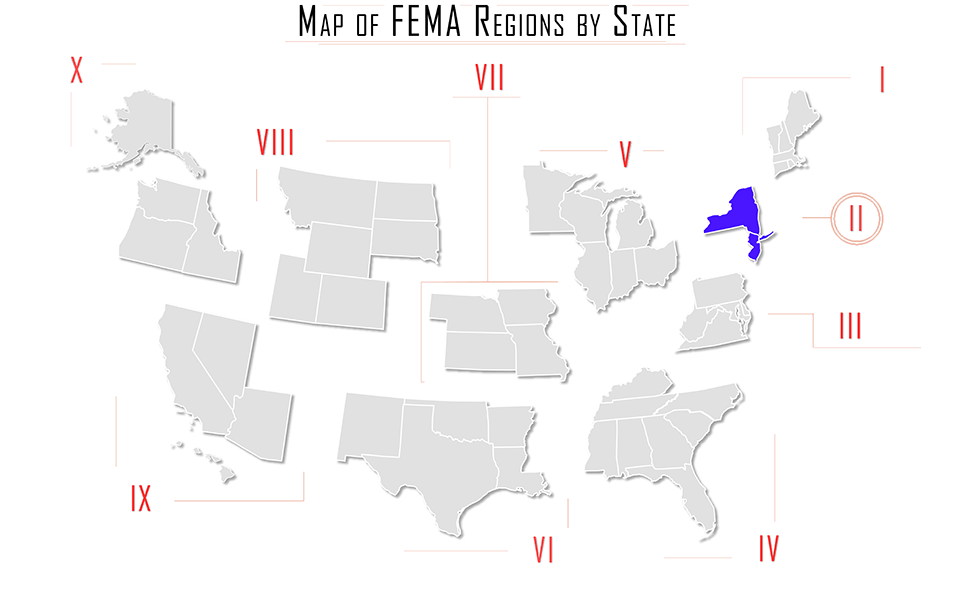.png)
Law enforcement includes an extremely diverse range of angencies dedicated to pormoting safety and public order through the application of national and regional laws and regulations. The variation of laws and penalties nationally and internationally necessitates region-specific training and specialization, while at the same time, officers must be familiar with overarching legislation and judicial decisions governing procedure and jurisdictional reach. This applies to agencies at the federal, state, county, and municipal levels, all of whom serve and protect their constituency in a dangerous field that exists within a complex and challenging framework.

 New York
New York

 New York
New York New York state code provides a baseline of standards to be applied to police departments, though individual agencies may set more rigorous requirements in terms of age, education, physical agility, etc.
Basic standards include:
• An age of 20 to 35 at the time of appointment, with a year subtracted from the candidates age for every year of military service up to six years.
• High School diploma
• Candidate meets height, weight and fitness requirements
• Good moral character
• An age of 20 to 35 at the time of appointment, with a year subtracted from the candidates age for every year of military service up to six years.
• High School diploma
• Candidate meets height, weight and fitness requirements
• Good moral character
Law enforcement agencies in New York generally select recruits through a competitive Civil Service and/or department examination. Frequently asked questions regarding the police officer test, and a study guide are provided here. A calendar of State Civil Service exams through December is provided here, along with a sign-up form to receive notices of future listings.
The office of Public Safety provides mandated direct training and oversight for police and peace offices as well as security guards in New York State. A current calendar of training events is provided here.
Agencies in New York have the option of undergoing a State accreditation process through the Division of Criminal Justice Services. The program is based on 133 Accreditation Standards developed for New York, and accredited agencies receive benefits such as lower insurance rates after completing the process. The Standards include administrative, operational and training requirements, and agencies must develop mechanism for accreditation, and the number of personnel they employ may be found here.
Reciprocity
The reciprocity requirements in New York are determined by individual departments; however, it is a common requirement that any transferring officers take the Civil Service examination regardless of experience, and prior service may not be considered as part of the selection criteria when reviewing results. Following the successful completion of the exam, a department may elect to waive part or all of its academy requirements for the applicant at the agency’s discretion. “A typical officer, who worked and was trained in another state, should expect to complete 264 to 535 hours of additional training (this number is dependent on the level of training previously completed).” “Agencies that have appointed police officers who are eligible for the Police Equivalency Course should contact the Office of Public Safety at (518) 457-2667, for further information.”
 New Jersey
New Jersey


Agencies in New York have the option of undergoing a State accreditation process through the Division of Criminal Justice Services. The program is based on 133 Accreditation Standards developed for New York, and accredited agencies receive benefits such as lower insurance rates after completing the process. The Standards include administrative, operational and training requirements, and agencies must develop mechanism for accreditation, and the number of personnel they employ may be found here.
Reciprocity
The reciprocity requirements in New York are determined by individual departments; however, it is a common requirement that any transferring officers take the Civil Service examination regardless of experience, and prior service may not be considered as part of the selection criteria when reviewing results. Following the successful completion of the exam, a department may elect to waive part or all of its academy requirements for the applicant at the agency’s discretion. “A typical officer, who worked and was trained in another state, should expect to complete 264 to 535 hours of additional training (this number is dependent on the level of training previously completed).” “Agencies that have appointed police officers who are eligible for the Police Equivalency Course should contact the Office of Public Safety at (518) 457-2667, for further information.”
 New Jersey
New Jersey The New Jersey State Association of Chiefs of Police manage and administer exams and training requirements for Law Enforcement Officers in New Jersey. LEOs fall into two hiring categories; “roughly half of the law enforcement agencies fall under the Civil Service (Department of Personnel; Title 11) regulations, while the other half hire according to local ordinance or regulation.”
New Jersey Police Training Commission(PTC) provides development and certification of basic police training courses, as well as certification of all instructors, trainees, and authorized law enforcement academies. A list of certified New Jersey Police Training Academies can be found here.
New Jersey Police Training Commission(PTC) provides development and certification of basic police training courses, as well as certification of all instructors, trainees, and authorized law enforcement academies. A list of certified New Jersey Police Training Academies can be found here.
When applying for entry to a law enforcement field, the examinations and requirements depend on the hiring department; approximately half of the active agencies are part of the Civil Service, and applicants must take the Civil Service Examination. Applicants in this job area will follow the State’s nine step hiring process, which includes the application, evaluation, and exam. Applicants who are veterans are given “absolute preference” in competitive hiring situations, and the steps required to demonstrate proof of status are available here.
The New Jersey Compensation schedules for civil service employees can be found here, 2017 scale begins in Appendix A on A-35. Schedules for LEO Civil Service Testing dates and study guides can be found here.
The FAQs for the Entry-Level Law Enforcement Examination for Civil positions are available here. Agencies that are not part of the Civil Service have varying requirements, generally involving an examination. Announcements for opening will typically be posted in local papers and/or on the various departments' websites.
The New Jersey Compensation schedules for civil service employees can be found here, 2017 scale begins in Appendix A on A-35. Schedules for LEO Civil Service Testing dates and study guides can be found here.
The FAQs for the Entry-Level Law Enforcement Examination for Civil positions are available here. Agencies that are not part of the Civil Service have varying requirements, generally involving an examination. Announcements for opening will typically be posted in local papers and/or on the various departments' websites.
General requirements for personnel include:
• US citizenship
• Age in the range of 21-35 years (18 years for some departments)
• Good moral character and sound physical health
• The ability to write and speak English
• US citizenship
• Age in the range of 21-35 years (18 years for some departments)
• Good moral character and sound physical health
• The ability to write and speak English
In addition to standard certification offered through a department, New Jersey offers interested applicants who are not yet employed to take Alternate Route academy courses. These courses qualify an applicant for hire for three years after course completion, and are paid for by the student. An examination is required for entry to the academies, and the process is competitive. Resources for active members of law enforcement organizations, such as ongoing trainings and general announcements, may be found on the resource page of the Office of the Attorney General.
Reciprocity
Reciprocity
New Jersey departments may accept lateral transfers at the agency’s discretion; some departments actively seek qualified out of state applicants, while other agencies do not accept lateral transfers of any kind. Agencies may also evaluate an officer’s prior training and require that they take a certain academy classes, but not require that they complete the entire program. It is recommended that interested applicants contact the department of interest for their full policy prior to considering any form of transfer. For more information on a training waiver, visit: .
Completed requests must be mailed to:
Completed requests must be mailed to:
Police Training Commission
Division of Criminal Justice
25 Market Street, P.O. Box 085
Trenton, NJ 08625-0085
Division of Criminal Justice
25 Market Street, P.O. Box 085
Trenton, NJ 08625-0085








